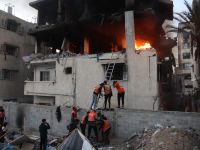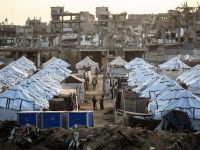Syrian troops based in Beirut and surrounding, mainly Christian-populated areas, began pulling out overnight, heading eastward in a redeployment demanded for months by Lebanese Christian and other opposition leaders, officials told AFP.
"The redeployment began last night and is to continue for several days until the end of the week," a high-ranking Lebanese official told the agency, on condition he not be identified.
"It follows decisions taken in the spring (of 2000) but suspended as a result of anti-Syrian campaigns waged during the legislative elections" last year, he added.
The official said the move was decided by Lebanese President Emile Lahoud and his Syrian counterpart, Bashar Al Assad, along with the military high commands of the two countries.
AFP had quoted a statement by the Lebanese army saying the move would take place in the coming few days.
The Lebanese army said the forces concerned include those stationed at Yarze, in Christian east Beirut where the Lebanese defense ministry is located, at Baabda, site of the presidential palace, and Mount Lebanon.
"We began to evacuate all our positions in this sector last night," a Syrian colonel in a position overlooking the defense ministry told AFP. "We will be finished within the day."
The colonel said the move was in line with the 1989 Taef agreement which ended the 15-year Lebanese civil war. It stipulated that Syrian troops based in the country since the mid-1970s be pulled back to the eastern Bekaa valley within two years after the introduction of Lebanon's new constitution, which occurred in 1990.
However, another Syrian officer supervising the dismantling of a nearby position and the loading of trucks by troops said others would replace them.
Seven Syrian positions in the southern suburbs of Beirut, including Hadath, Bir Hassan and Bourj Barajneh, had been dismantled, AFP reporters and photographers said.
By midday none had been handed over to the Lebanese army but generally the remaining Syrian troop presence was no more than symbolic, amounting to a handful of men.
On the road heading northeast towards Damascus, convoys and Syrian army trucks and buses were seen, bearing portraits of Assad and his late father, Hafez, said the agency.
A Lebanese official and Syrian officers said they would be regrouping in the Dhour Choueir region, a Syrian base some 20 kilometers (12 miles) from Beirut.
Opponents of the Syrian presence in Lebanon have stepped up calls this year for the troops to be redeployed, following the end of the 22-year Israeli occupation of southern Lebanon in May 2000.
Most recently, the Free Patriotic Movement released a statement on Wednesday criticizing President Emile Lahoud’s recent remarks on Lebanese-Syrian relations, reported the Daily Star newspaper.
The statement referred to an interview given by Lahoud to Maghreb Arab Presse (MAP) on Tuesday on the eve of his departure on a two-day official visit to Morocco.
It quoted Lahoud as saying Lebanese-Syrian cooperation would remain an example of Arab cooperation until the Golan Heights were liberated and a just and comprehensive peace established.
“By linking the withdrawal of Syrian troops from Lebanon to liberating the Golan and achieving peace, the president has introduced a new condition to justify Syrian occupation,” the statement said.
It added that "the eventual purpose of such a condition is to indefinitely keep Lebanon a hostage state, subservient to Syrian hegemony.
Western military experts quoted by AFP said the number of Syrian troops in Lebanon was cut a year ago from 35,000 to 27,000. They are present virtually throughout the country except the south and analysts said the current redeployment did not mean a withdrawal, especially of the ubiquitous Syrian intelligence officials.
Lebanese Maronite Patriarch Nasrallah Sfeir, the strongest critic of the presence of Syrian troops, expressed his "satisfaction" Thursday as he met with a French parliamentary delegation, a French MP said.
The leader of Lebanon's largest Christian community however added "there was still a long way to go before relations between Syria and Lebanon were balanced,” the same source told AFP.
Druze community leader Walid Jumblatt, another of the most vocal opponents of Syria's military presence in Lebanon, said: "I think it's a start, a first step. It will stabilize Lebanese-Syrian relations and improve the atmosphere.”
Jumblatt, a former Damascus ally in Lebanon, said that he had never asked for a total Syrian troop pullout, "because the strategic needs of Syria toward Israel have to be understood.”
He added that the next step should be "economic re-balancing.” – Albawaba.com
© 2001 Al Bawaba (www.albawaba.com)







